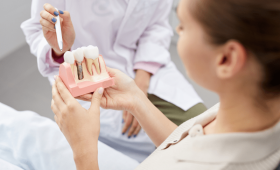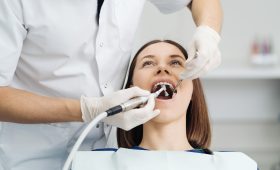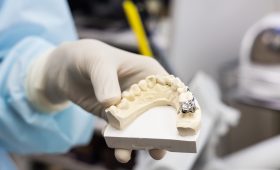The Cost and Challenges of Dental Implants
While dental implants are one of the most effective and permanent solutions offered by modern dentistry, their cost can be an inaccessible barrier for many people. In the USA, the cost of a single dental implant can range from $1,500 to $6,000, depending on the type of implant, the surgeon’s experience, and geographic location. The total cost, including all stages of the procedure (implant placement, abutment, and crown), can increase from $3,000 to as much as $10,000.
When multiple implants are needed, these figures can quickly escalate to costs in the hundreds of thousands of dollars. This situation creates a significant financial burden, especially for individuals who are uninsured or have limited insurance coverage. This guide aims to provide a detailed overview of various methods and resources you can use to overcome these high costs. Each heading represents a potential path that may be suitable for you, and each option will be examined in detail to provide in-depth information.
Dental Schools and Training Programs
Dental schools are one of the best places to start when looking for free or very low-cost dental implant treatment. These schools accept patients to provide their students and new graduates with experience. Treatments are performed under the close supervision of experienced professors and licensed dentists. This reduces the cost for patients while ensuring the high quality of the treatment. However, appointments at these clinics can often take longer, and procedures may require more sessions due to the educational process. Before applying, it is important to get detailed information about the school’s implant program and check the status of their waiting lists.
Implant Procedures at Dental School Clinics
When receiving implant treatment at a dental school, the stages of the procedure are meticulously followed, and each step is approved by a faculty member. First, a comprehensive patient evaluation and planning are carried out. The placement of the implant, the condition of the jawbone, and whether additional procedures like a sinus lift or bone graft are needed are all examined.
As students perform the procedure step by step, supervisors provide instant feedback and corrections. Although this process may cause the treatment to take longer, it usually provides a cost advantage of 50% to 70% compared to commercial clinics. Some schools may accept a limited number of cases for completely free treatment.
Medical Research Programs and Clinical Trials
Dental implant technologies are constantly evolving. Companies and universities working on new implant designs, materials, or surgical techniques need volunteer patients to test these products. These clinical trials and research programs often cover the entire cost of the treatment (the implant itself, surgery, and follow-up care), offering participants the opportunity to receive a free implant. To be a participant, certain criteria (such as age, general health status, cause of tooth loss, etc.) must be met. These programs are usually announced by hospitals or research centers in a specific region.
Charitable Organizations and Non-Profit Foundations
Across the USA, there are many non-profit organizations and foundations that aim to provide dental care to people in need. For example, organizations like Dentistry from the Heart or Smiles for Veterans can provide free or discounted implant treatment to individuals who meet certain conditions. These organizations are typically funded by donations and provide their services based on a predefined application process. Factors such as the applicant’s income level, medical history, and general need are taken into account. To apply for these programs, you must visit the organization’s website and fill out the application forms.
State-Funded Financial Aid Programs
In the USA, some programs at the federal and state levels provide financial support for dental care services. However, these programs generally do not cover dental implants and are designed more for basic dental care (fillings, extractions, etc.). Nevertheless, in some states or in specific situations (for example, for individuals who have lost teeth as a result of an accident or illness), special funds or programs for implant treatment may be available. Such support is typically provided through Medicaid or state health programs. It would be beneficial to contact your local state health department or social services agencies to research these options.
Government-Funded Health Centers and Community Clinics
In many states, there are government-funded community health centers and clinics that serve low-income families. These centers usually operate on a sliding-scale fee system, meaning the payment is determined by the patient’s income. While they often do not offer advanced procedures like dental implants, some may be able to provide these services at more affordable prices thanks to special funds or donations. These clinics often help address basic oral health issues before starting implant treatment. You can check the federal HRSA (Health Resources and Services Administration) website for information about these clinics.
Dental Associations and Pro Bono Services
Dental associations in some states, acting with a sense of professional responsibility, may offer free or pro bono services to a certain number of patients. These programs typically focus on individuals with rare conditions or serious needs. Applicants are required to document their financial situation and the urgent need for treatment. Such programs are usually announced annually or periodically, and their quotas are limited. A good strategy to catch these opportunities is to follow the website of the dental association in your state or contact them directly.
Dental Implant Companies’ Assistance Programs
Major dental implant manufacturers and distributors (e.g., Straumann, Nobel Biocare) may sometimes offer free or discounted implants through specific clinics as part of their promotional or social responsibility projects. These programs are typically run in partnership with a specific dental clinic or university. To catch such an opportunity, it may be beneficial to visit the websites of the most frequently used implant brands or ask your local dentist for information. Companies may provide dentists participating in clinical research or training programs with discounted or free implant kits.
Free Samples from Implant Manufacturers
In some rare cases, small or new companies launching a new implant model or product may offer free samples to certain dentists to test their products and gain a foothold in the market. These samples can allow the dentist to perform implant treatment on their own patients for free. However, this situation is very rare, and it is difficult for a patient to have direct access to this opportunity. The best way to catch such an opportunity is to ask your dentist if they are aware of such programs.
Aid Projects and Volunteer Dentistry Services
Across the USA, there are dental health camps and projects organized by volunteer dentists. These projects generally aim to provide free basic dental care services to disadvantaged segments of society, homeless people, or uninsured individuals. Some large-scale events (e.g., Mission of Mercy or Remote Area Medical – RAM) may also offer services for a limited number of implant cases. These events usually last one or two days, and patient admission is on a “first come, first served” basis. To attend these events where it is not possible to make an appointment, you may need to get in line early.
Religious Organizations and Dental Health Aid
Many religious organizations and churches offer various social services to their communities and people in need. Sometimes, these services may include dental health aid. Some churches may organize low-cost or free clinic days by collaborating with dentists. These programs generally serve local communities and are funded through donations or local community funds. To access this kind of help, it may be beneficial to contact local religious organizations and inquire about their assistance programs.
Coverage Areas of Some Insurance Companies
Most general health insurance plans in the USA view dental implants as a “cosmetic” procedure and exclude them from coverage. However, some high-cost or special insurance plans may partially or fully cover dental implants. This is usually the case when the implant is a medical necessity, such as to restore teeth lost as a result of an accident. It is important to carefully review the details of your insurance plan or contact your insurance provider directly to inquire about implant coverage. Additionally, some special dental insurance plans that offer implant coverage are also available.
Social Aid and Solidarity Associations
Local social aid and solidarity associations generally provide support to people in need within the community on various issues. This support may include local funds or networks that provide financial assistance for dental implant treatment. These associations typically evaluate individual situations and try to provide appropriate assistance. By contacting such associations, you can get information about available funds or programs for dental implant treatment in your area.
Credit Card and Special Financing Options (Discount-Oriented)
Most dental clinics offer special financing plans to help patients make costs more manageable. Credit cards designed specifically for healthcare services, such as CareCredit, offer interest-free payment options for a certain period (usually 6 to 24 months). This allows you to divide the implant cost into installments without paying interest. Some clinics may offer special discounts to patients who agree to pay in advance. While these options do not offer a free solution, they can be a tool to reduce the cost and make payment easier.
Support for Single Dental Implants Only
Some programs or organizations may focus on individuals who need only a single dental implant. These programs allocate funds for simpler procedures rather than for more complex and costly full-mouth rehabilitations. Patients looking for a single dental implant can increase their chances of success by researching such special programs. These programs are usually aimed at young adults who have lost a single tooth as a result of an accident or injury, or individuals with aesthetic concerns.
Special Dental Implant Programs for Seniors
Many seniors struggle with dental health issues because Medicare generally does not cover the cost of dental implants. However, some programs and organizations offer special services for seniors. Associations like AARP can offer special discounts for dental services. In addition, financial support for dental implant treatment may be available at the state level through senior health programs or social services.
Aid Organizations for Veterans and Military Personnel
In the USA, there are many aid organizations established specifically for veterans and active military personnel. Organizations like The Wounded Warrior Project or the Dental Lifeline Network can provide dental care services to these individuals and their families. These organizations are generally funded by donations and can offer implant programs specifically designed for veterans or military personnel. To apply for these programs, you must visit the organization’s website and review the application requirements.
Programs for People with Disabilities and Chronic Illnesses
In some states or at the federal level, special programs are available for individuals who have lost teeth due to chronic illnesses or disabilities. These programs can provide financial support when implant treatment is considered a necessity for the person’s general health. For example, a patient whose jawbone has been damaged due to cancer treatment or another illness may apply for coverage of a portion of the implant costs. Such support generally requires a medical report and a doctor’s recommendation.
Oral and Maxillofacial Surgery Clinics and Collaboration Opportunities
Some oral and maxillofacial surgery clinics may offer free or discounted services for a certain number of cases to promote new implant technologies or procedures. These clinics are often in close collaboration with implant manufacturers and may need volunteer patients to apply the new technology. These opportunities are usually limited, and patient selection is based on whether the case has educational value for the surgeon.
Online Crowdfunding Campaigns
Crowdfunding platforms like GoFundMe have become a popular method to cover the costs of dental implants. Individuals can raise donations from internet users by telling their personal stories and highlighting the urgency of their situation. This method can be effective, especially for people who do not have access to other options or need urgent treatment. For a successful campaign, it is important for the personal story to be sincere and touching, to keep donors informed with updates, and to actively share on social media.
Negotiation and Discount Methods with a Dentist
Do not hesitate to talk to your dentist directly about costs. Many dentists can offer payment plans to their patients or provide a discount if they are paid in advance. Offering to pay with cash, in particular, can be an attractive option for some clinics. In addition, visiting multiple clinics and comparing price quotes can be a smart strategy to find the most affordable option.
Finding the Right Timing to Reduce Costs
Dental clinics may offer special campaigns or discounts at certain times of the year (usually during tax season or at year-end). During these periods, patients may be able to get implant treatment at more affordable prices. Additionally, some clinics may offer free or discounted prices for the initial consultation and evaluation to attract new patients. To catch these opportunities, it is important to follow local clinics or contact them for information.
Understanding the Components of a Dental Implant Procedure
Understanding the different components that make up the total cost of a dental implant treatment can create opportunities to reduce the cost. The cost generally consists of three main parts: the implant itself (the screw), the abutment (the connector piece), and the crown (the visible tooth). Some programs may only provide support for the implant itself, while others may cover the entire procedure. Following a strategy of financing these components separately or seeking discounts from different providers for each component can help reduce the total cost.
Volunteer Dental Camps and Events
National volunteer dental events like Mission of Mercy (MOM) provide free dental care services to thousands of people in need each year. These events are usually set up in a gym or conference center and bring together hundreds of volunteer dentists and assistants. Basic services like tooth extraction and fillings are usually prioritized, but a limited number of implant treatments may also be performed at some events. To participate in these events, you usually need to be in a specific area and get in line early.
Online Support Groups and Resource Sharing
Facebook groups, Reddit forums, and other online communities can be a great source of information for people looking for dental implant treatment. In these groups, other people share their experiences, provide information about low-cost or free implant opportunities, and offer advice. These groups can be a priceless resource for learning about personal stories and local programs.
Application Processes and Required Documents
Applying for free or discounted dental implant programs is often a detailed process and requires various documents. These may include proof of income, insurance status, medical history, dental X-rays, and doctor’s reports. Each program may have its own specific requirements. Therefore, before applying, it is important to carefully review the program’s website and prepare all documents completely. Application processes can take months due to high demand, so patience is necessary.
Combining Multiple Methods
The most effective strategy is to combine multiple methods. For example, you can get a preliminary evaluation at a dental school and then apply to an aid organization. Or you can start a crowdfunding campaign and at the same time check your eligibility for a research program. By seeking help from different channels, you can increase your chances. Rather than sticking to a single option, evaluating all potential opportunities simultaneously can help you reach your goal faster.
Risks and Limitations: What to Look Out For?
When applying for free or low-cost implant programs, it is important to be aware of some risks and limitations. Treatments at dental schools may take longer and require more appointments. In clinical trials, the long-term effects of the new technology used may be unknown. In addition, some programs may only offer support for certain types of implants and may place restrictions on the treatment plan. Before applying for any program, it is essential to carefully understand the potential risks and limitations and make an informed decision.
The Challenges in the USA and an Alternative Solution: Turkey
The effort to find free or low-cost dental implants in the USA can be quite challenging due to strict application processes, long waiting lists, and limited quotas. Most programs focus on single-tooth or simpler procedures rather than full-mouth rehabilitations. This is a big problem for those who need multiple implants. Given these challenges, an international alternative becomes a much more logical option for many people, both in terms of cost and quality.
One of these alternatives is Turkey, which is a world leader in dental tourism. Turkey offers high-quality dental implant treatments at just a fraction of the cost in the USA. The country has technologically advanced clinics and world-renowned dentists and surgeons who have received internationally recognized training. The implant brands are generally globally known brands like Straumann and Nobel Biocare, and the quality of the materials used is at the highest level.
In Turkey, dental implant treatment, including the implant itself, the surgical procedure, the abutment, and the crown, is usually one-third or one-fourth of the total cost in the USA. This cost advantage is large enough to cover not only the treatment expenses but also airfare, accommodation, and vacation costs. This means that a patient can get multiple implants in Turkey and even have a vacation for half the price they would spend on a single implant in the USA.
Clinics in major cities like Istanbul, Izmir, Antalya, and Ankara offer special services for international patients. These include airport transfers, accommodation arrangements, translation services, and the organization of post-treatment follow-up appointments. Clinics in Turkey can usually arrange appointments quickly and complete the treatment in a short time, which eliminates long waiting periods.
In conclusion, the time and effort spent searching for a free implant in the USA can often be less efficient compared to the opportunity to find a much more affordable, faster, and higher-quality treatment in a country like Turkey. Therefore, I highly recommend you research the dental tourism options in Turkey to make the best use of your budget and time.


